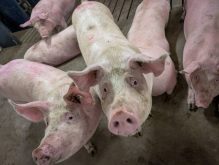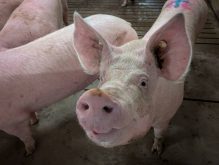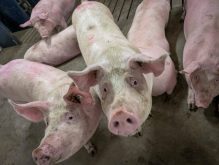Glacier FarmMedia—Pork made from gene-edited pigs could soon be on supermarket shelves in Canada.
In early May, the U.S. Food and Drug Administration announced that pigs with genes edited for resistance to Porcine Reproductive and Respiratory Syndrome, PRRS, can be used in the U.S. food supply.
The technology was developed by a British firm, Genus, an animal genetics company. Its headquarters are in Basingstoke, England and has research labs in Madison, Wisconsin.
Read Also

Canadian agriculture must build on the moment federal politicians say
Labour, investment, research and red tape as among the challenges the federal government and agriculture sector must address to increase productivity and competativeness politicians pointed to at the Canadian Federation of Agriculture (CFA) AGM.
“FDA approval is a fantastic achievement for Genus PIC and represents a major step towards U.S. commercialization,” said Jorgen Kokke, Genus chief executive officer. ”We will now continue to pursue regulatory approvals in other international jurisdictions with a focus on key U.S. export markets.”
The PIC in Genus PIC stands for Pig Improvement Company.
In a statement, Genus explained that gene-edited pigs won’t be produced in America until the company receives regulatory approval in key export markets for U.S. pork – like Canada, Mexico and Japan.
“(Genus) continues to make progress with regulators in these jurisdictions as well as with other international regulators, including China.”
Potential breakthrough for hog producers
Pigs with resistance to PRRS could be a breakthrough for hog producers in America and around the globe. The disease causes respiratory distress in pigs of all ages and reproductive problems in breeding stock, says Iowa State University.
Research on the economic impact of PRRS, suggests that it causes US $1.2 billion in lost production, annually, for America’s pork industry.
In Canada, annual losses have been pegged at $130 million.
To develop a pig with resistance to PRRS, Genus scientists deleted a section of DNA that produces a certain protein. The virus uses that protein to enter and infect the pig.
“With this small gene edit, the pig is resistant to PRRS, as the virus is unable to enter the cells and replicate,” the National Hog Farmer reported. “Like humans inherit traits from their parents, the pig’s offspring will inherit the PRRS-resistant trait.”
The U.S. Food and Drug Administration decision, saying these gene edits as safe for pigs and for humans who consume the pork, confirms what Genus found in a 2024 paper.
“Removing the SRCR5 domain from the CD163 protein confers resistance to PRRS (virus) and… resulted in no detected differences in meat composition and no changes in the growth rate, health, and ability to farrow,” says the paper published in Frontiers in Genome Editing.
“These results support the targeted use of gene editing in livestock animals to address significant diseases without adversely impacting the health and well-being of the animals or the food products derived from them.”
















